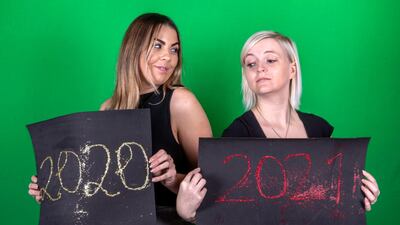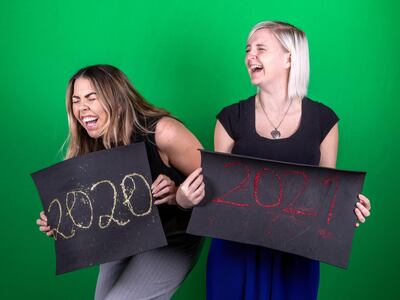Every week, we get two people with opposing views to debate a trending topic. This week, The National's Katy Gillett and Sophie Prideaux are discussing the very meaning of time, and whether or not 2020 can technically be called the start of a new decade.
Katy Gillett: It seems straightforward that the year 2020 would start a new decade, but actually it's a little more complicated than that.
Sophie Prideaux: Is it, though?
KG: TimeandDate.com writes this: "Contrary to popular belief, the 21st century and the third millennium did not begin on January 1, 2000, but one year later, on New Year's Day 2001."
SP: But surely the concept of a decade is straightforward – a period of time spanning 10 years, starting on the zero year, through to the end of the ninth year?
KG: It's all to do with the language we use, apparently. Firstly, there was never a zero year, so we start with one. And when it comes to centuries and millennia, the 1900s, for example, actually began on 1901. For decades, generally speaking, it would go from the year 0 to 9, which means we have entered the Twenties, but the 203rd decade doesn't technically begin until 2021, if that makes any sense!
SP: But you can't simply wipe out the zero year. When children turn 10 years old, they have been alive for 10 years, and they are about to enter the 11th year of their lives. Surely that concept is the same for decades? We are now in 2020 – these 12 months between now and 2021 very much count as part of that decade. If I had just turned 20, I would be considered to be in my twenties, so why is it any different with time?
KG: That's the thing – we have most definitely entered the Twenties, but not the 203rd decade, technically speaking.
SP: As American periodical Farmers' Almanac explains: "Think of going into a building in which the ground floor is listed not as the first floor, but as the lobby. So the first floor is actually one flight above you. So if you were to go into an elevator located in the lobby and wanted to go 10 flights up, you would actually end up on the ninth floor, if you were to assume that the lobby is the 'zero' floor." There are still 10 floors.
KG: That's a good point. I've read quite a few articles about this now, and while most of them are pretty complicated, what it essentially boils down to is this: we're both right.
The Farmers' Almanac analogy is a bit confusing though, because then it goes on to say: "insist that decades begin with the year ending in the numeral one and finish with a zero. For a decade to begin, we must start with the year ending with one – 2021 – and finish with 10, or so far as chronology is concerned, a year ending in zero – 2030."
So, basically, once we’re done with this year we can start a new decade.
SP: Surely that is contradictory to its building analogy? My brain hurts.
KG: It seems like it. I'm not really sure I completely understand it, either. What I gather is it all boils down to the fact we started time as we know it with Year 1. But I'm paying more attention to what TimeandDate.com goes on to say: "In essence, both are correct … Equipped with this knowledge, you can go ahead and party extra hearty two years in a row: to welcome the Twenties on January 1, 2020, and to celebrate the start of the 203rd decade when the
New Year countdown reaches zero at midnight on January 1, 2021."
So our end-of-the-decade celebrations aren’t over yet.
SP: This is all very technical. I think, realistically, looking at decades the way we do is much more in line with the way most people view the passing of time. Having the zero year start a new decade matches the way we view age – babies aren't just born one year old. It makes it easier to look back at periods of history and our own lives. If there was no zero year, someone, somewhere has messed up when counting how many years have passed.
KG: There's not much we can do about that now, I guess! Ultimately, I think most people aren't going to concern themselves with it too much, and they've already celebrated the start of a new decade, but it's interesting to think about. Time is really quite complicated – think about when the clocks move back (or forward) in some countries, but not in others. There are 39 different time zones and Sri Lanka is 90 minutes ahead of us. Once you really start thinking about it all, the mind boggles.
SP: And leap years! Exactly, there are so many things that affect timescales, which is why it is far easier to think of time the way we do, in nice round decades.
KG: Happy New Year!
SP: Whatever decade it may be.


